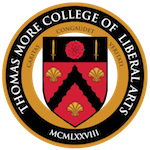In Principio erat verbum, et verbum erat apud Deum, et Deus erat Verbum.
–from the Prologue of the Holy Gospel according to St. John
Our knowledge of human things is bound up in monuments, images, sounds, and, especially, words. From its rude beginnings to its splendid heights, civilization has always been associated with the public celebration and recollection of the deeds of men and women. From triumphal arches, equestrian statues, odes, symphonies, and tragedies, to cathedrals and palaces, sermons and orations, string quartets, essays, and epics: the learned and the talented throughout the centuries have sought to preserve their hard-won wisdom by handing it down in forms that would delight the senses, capture the attention, and inflame the admiration of succeeding generations. All of these works of creativity—by scops and bards, architects and composers, orators and philosophers—have a role to play in a liberal education, for, as the great Aquinas once put it, “Every kind of knowledge and art is ordered to one end: the perfection of man, which is his beatitude.” Indeed, any truly great human work draws forth from our souls those seeds of truth, beauty, and goodness with which we have been so liberally endowed by our Creator.
From the grand tours of European capitals made by the sons of the aristocracy to study-abroad programs today, from the study of the Latin and Greek classics to Great Books programs, a course of reading, hearing, and seeing human things, res humanae, has always been understood to be at the heart of liberal education. At Thomas More College we place ourselves in this rich, central tradition of humanistic formation, and with our eight-semester sequence in the Humanities, together with associated courses in the fine arts, poetry, and rhetoric, we aim to preserve and to articulate afresh for our generation an experience of human things that shapes the soul through the true, the beautiful, and the good.
In the Humanities sequence there is, most appropriately, a focus upon the word. By reading works from a wide variety of genres—lyric, tragic, and epic poetry, sermons and orations, biographies and chronicles, letters, essays, and treatises—our students encounter the full range of human experience and profit from the virtues of both historical and literary study. Through works of the imagination, they are exposed to the heights and depths of experience as portrayed by the artist. Through other genres, they enter into the real, lived human experience of their own ancestors, and consider the first-hand reactions to and reflections upon those experiences by both the wise and the simple. And just as distinctions are made among authors and genres, so some texts are read slowly and in full, while others are encountered in part or read more quickly. All of these works of creativity have a role to play in a liberal education, for, as the great Aquinas put it, “Every kind of knowledge and art is ordered to one end: the perfection of man, which is his beatitude.”
